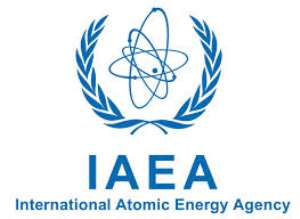
Fukui, Japan, Oct. 5, GNA - Ghana is participating in an International Atomic Energy Agency (IAEA) Technical Meeting on Best Practices in Media and Public Communication for Nuclear Power Programmes (NPP), which opened on Monday in Fukui, Japan.
The four-day meeting, which is being hosted by the Fukui Prefectural Government, seeks to provide practical guidance on stakeholder involvement, with a focus on the public, for new and established nuclear power programmes, taking into account good practices and lessons learned from Japan and other countries.
The meeting would consist of a series of presentations, question and answer sessions, and interactive breakout sessions to discuss common challenges and effective solutions for engaging with stakeholders, and a day's tour of nuclear-related facilities, such as NPPs, the Fukui Prefectural Environmental Radiation Research and Monitoring Center, and the Dinosaur Science Museum.
Topics to be discussed at the meeting include: Public acceptance for the areas hosting NPPs in Fukui Prefecture, outreach and educational programmes on science, radiation and nuclear technologies in the elementary and secondary school system, public acceptance in Japan after the Fukushima Daiichi accident, relations with the media, risk communication, communication on nuclear emergency preparedness and response aimed at local residents in Fukui Prefecture.
Representatives from about 32 countries including Japan, South Africa, Malaysia, Poland, Switzerland, Pakistan, India, Morocco, Romania, Brazil, Bulgaria, France and Belarus are attending the meeting, which would also provide a platform for knowledge sharing and networking among participants.
Ghana has representatives one each from the Ghana Atomic Energy Commission and the Ghana News Agency to contribute to the various discussions and discourse.
Mr Issei Nishikawa, Governor of the Fukui Prefectural Government, in an address at the opening ceremony, said the IAEA since 2012, sought to increase efforts to engage with stakeholders impacted by, or with an interest in nuclear power, and has organized annual events open to Member States operating NPPs as well as to advanced newcomer countries so that they could share experiences and learn from each other in this area.
He said stakeholder engagements form a critical aspect of the successful implementation of nuclear NPPs, which must never be overlooked, since such engagements do not only ensure a high sense of public ownership and involvement in the decision making process, but also brings about trust, transparency and help to alleviate all manner of fears of the risks associated with NNPs among stakeholders, while assuring them of their safety.
He explained that more than four years after the earthquake and tsunami that struck the north-eastern coast of Japan and triggered the accident at the Fukushima Daiichi Nuclear Power Plant, the Japanese Government was moving towards a nuclear comeback.
However, a sustainable comeback must be supported by the public, who have presently lost trust in the government and raised several protests regarding evacuation exercises due to the lack of proper understanding of the various issues at stake.
Mr Nishikawa explained that the Fukui Prefecture has the highest number of 14 reactors which was more than any Japanese Prefecture, and the Japanese Government has worked consistently with the key stakeholders involved in order to increase public understanding and appreciation of nuclear energy, especially at the local level, including gathering lessons learned and new good practices on public communication, which it was planning to share with Member States introducing or operating nuclear power, whilst learning from their experience at the same time.
Dr Yoshiaki Oka, Chairman of the Japan Atomic Energy Commission, said in spite of the world huge cost and the accompanying high demand of electricity globally, nuclear power use which was comparatively cheap to generate, was still very low even in highly industrialized countries.
He said risk communication must therefore include an understanding of the full risk issues of nuclear accidents which include evacuation activities to temporary locations, counseling and compensation, and not a one-sided story on radiation risks to create fear and Punic.
He said no single approach was enough, but there must be a wide range of techniques for public education, and urged IAEA Member-Countries to institute best practices by establishing independent press offices for easy access to simplified information and create platforms for sustained public dialogue with scientists and ensure that such information were readily available on the internet.
By Christable Addo, GNA special correspondent, Fukui, Japan, Courtesy Ghana Atomic Energy Commission




 Dumsor: Don't rush to demand timetable; the problem may be temporary — Atik Moha...
Dumsor: Don't rush to demand timetable; the problem may be temporary — Atik Moha...
 Space X Starlink’s satellite broadband approved in Ghana — NCA
Space X Starlink’s satellite broadband approved in Ghana — NCA
 2024 election will be decided on the grounds of the economy; choice of running m...
2024 election will be decided on the grounds of the economy; choice of running m...
 Dumsor: We're demanding less; just give us a timetable — Kwesi Pratt to ECG
Dumsor: We're demanding less; just give us a timetable — Kwesi Pratt to ECG
 Do I have to apologise for doing my security work, I won’t – Simon Osei-Mensah r...
Do I have to apologise for doing my security work, I won’t – Simon Osei-Mensah r...
 All my businesses have collapsed under Akufo-Addo — NDC Central regional chair
All my businesses have collapsed under Akufo-Addo — NDC Central regional chair
 Military, Prison Officers clash in Bawku, three injured
Military, Prison Officers clash in Bawku, three injured
 GRA-SML contract: MFWA files RTI request demanding KPMG report
GRA-SML contract: MFWA files RTI request demanding KPMG report
 Court threatens to call second accused to testify if NDC's Ofosu Ampofo fails to...
Court threatens to call second accused to testify if NDC's Ofosu Ampofo fails to...
 Family accuses hospital of medical negligence, extortion in death of 17-year-old...
Family accuses hospital of medical negligence, extortion in death of 17-year-old...
